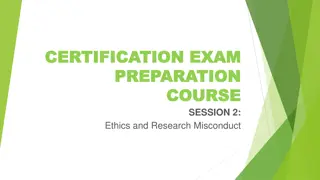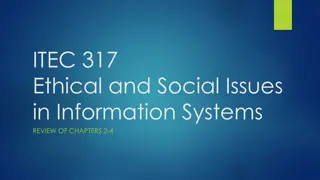Ethics in Psychological Research: Ethical Considerations & Issues
Ethical considerations in psychology research encompass issues such as plagiarism and falsifying data. Plagiarism involves claiming others' work as one's own, while falsifying data includes fabricating research results. Detecting such misconduct is crucial to maintaining the integrity of scientific research. Moreover, ethical treatment of human subjects involves obtaining informed consent and avoiding deception in experiments. Adhering to ethical guidelines is essential for conducting valid and reliable psychological research.
Download Presentation

Please find below an Image/Link to download the presentation.
The content on the website is provided AS IS for your information and personal use only. It may not be sold, licensed, or shared on other websites without obtaining consent from the author.If you encounter any issues during the download, it is possible that the publisher has removed the file from their server.
You are allowed to download the files provided on this website for personal or commercial use, subject to the condition that they are used lawfully. All files are the property of their respective owners.
The content on the website is provided AS IS for your information and personal use only. It may not be sold, licensed, or shared on other websites without obtaining consent from the author.
E N D
Presentation Transcript
Psychology 3450W: Experimental Psychology Fall, 2019 Professor Delamater
Ethics in Research Ethical Considerations in Psychological Research 1. Ethical Issues with regard to scientific conduct 2. Ethical Issues with regards to experimental subjects
Ethics in Research Ethical Considerations in Psychological Research 1. Ethical Issues with regard to scientific conduct A. Plagiarism Use of others ideas and written words and claiming them as your own.
Ethics in Research Ethical Considerations in Psychological Research 1. Ethical Issues with regard to scientific conduct A. Plagiarism Use of others ideas and written words and claiming them as your own. Easy to detect with word checking programs. This should become less and less of a problem, as people understand their responsibility is to communicate their own ideas.
Ethics in Research Ethical Considerations in Psychological Research 1. Ethical Issues with regard to scientific conduct A. Plagiarism Use of others ideas and written words and claiming them as your own. Easy to detect with word checking programs. This should become less and less of a problem, as people understand their responsibility is to communicate their own ideas. B. Falsifying data This is when an investigator, essentially, makes up their data.
Ethics in Research Ethical Considerations in Psychological Research 1. Ethical Issues with regard to scientific conduct A. Plagiarism Use of others ideas and written words and claiming them as your own. Easy to detect with word checking programs. This should become less and less of a problem, as people understand their responsibility is to communicate their own ideas. B. Falsifying data This is when an investigator, essentially, makes up their data. This should be detectible through the scientific process because experiments will fail to replicate, and in the review process peer reviewers may detect abnormalities in the data. Still, a lot of wasted time and resources can occur if people falsify their results because this can lead investigators astray. A good example is the controversy over vaccination and autism. That link has been discredited because of data fabrication, yet people still believe there is a link. Fortunately, these cases are relatively rare in the literature!
Ethics in Research Ethical Considerations in Psychological Research 2. Ethical Issues with regard to experimental subjects Human Research Ethical treatment of human participants ensured. a. Informed consent Seeking participant s approval to participating in the study with any potential risks identified). b. Deception Used to disguise the true intent of the experiment so as to solicit natural responses from the participant. Debriefing: Includes 2 components dehoaxing and desensitizing. Dehoaxing refers to revealing the true intent of the study. Desensitizing refers to administering any necessary supplementary therapy. c. Coercion and Freedom to decline participating Participants need to be given the option of declining participating in the experiment and withdrawing from the experiment at any time. Participants may be given an incentive to participate by earning extra course credit, or as part of a course. But, if they decline to participate other options must be made available. d. Cost/Benefit Analysis If the experiment includes risks to the subject, then do the benefits outweigh the potential costs? For example, cancer research and new drug treatment with side effects.
Ethics in Research Ethical Considerations in Psychological Research 1. Ethical Issues with regard to experimental subjects Animal Research Ethical treatment of animals must be ensured. 2. Procedures to ensure ethical guidelines are followed (both human and non-human animal research) Research Cycle: Scientist has an idea Paper is published Designs an experiment Paper is not published or Peer Review Develops a protocol Submits protocol for approval to Institutional committee (IRB, IACUC) Performs Experiment Submits paper to scientific journal
Ethics in Research Ethical Considerations in Psychological Research Checks for ethical conduct 1. at the protocol approval stage (NIH guidelines must be followed) 2. at the Peer Review stage (where outside examination of adherence to ethical guidelines is made). Research Cycle: Scientist has an idea Paper is published Designs an experiment Paper is not published or Peer Review Develops a protocol Submits protocol for approval to Institutional committee (IRB, IACUC) Performs Experiment Submits paper to scientific journal























